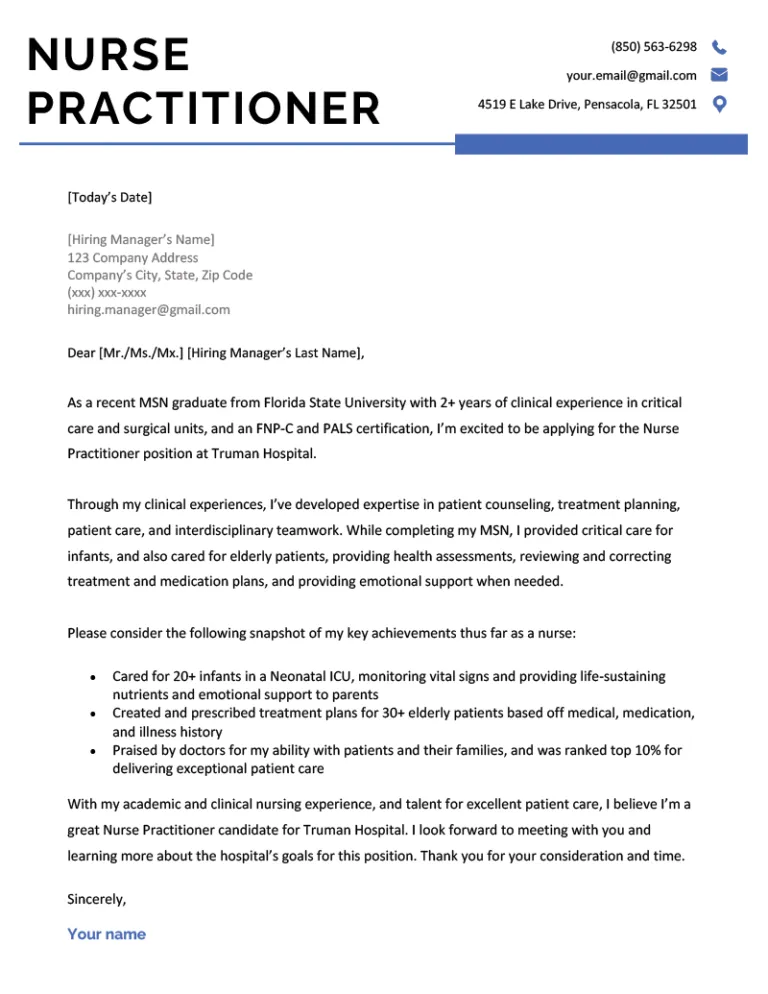Understanding the Nurse Practitioner Cover Letter
A nurse practitioner cover letter is more than just a formality; it’s your first opportunity to make a strong impression on a potential employer. This crucial document complements your resume and provides a personalized narrative that showcases your qualifications, skills, and passion for the nursing profession. It allows you to explain why you are the perfect fit for the specific role and organization, setting you apart from other applicants and increasing your chances of securing an interview. A well-crafted cover letter can transform a standard application into a compelling case for your candidacy.
Why a Cover Letter is Crucial for Nurse Practitioners
In the competitive field of healthcare, a cover letter serves as your personal introduction. It allows you to go beyond the bullet points of your resume and delve into the experiences and skills that make you unique. It’s an opportunity to connect with the hiring manager on a personal level, demonstrating your enthusiasm for the position and the organization. The letter shows that you understand the role and the institution’s values, proving that you’ve taken the time to research and personalize your application.
A nurse practitioner’s expertise extends beyond clinical skills; your cover letter should reflect that. It shows your ability to communicate effectively, a critical skill for patient care and interdisciplinary collaboration. By sharing your motivations and demonstrating your understanding of the role, you highlight your potential contributions to the team and the organization’s goals. This personalized approach can significantly improve your chances of getting noticed and advancing to the interview stage. (nurse-practitioner-resume-tips)
Highlighting Your Credentials and Experience
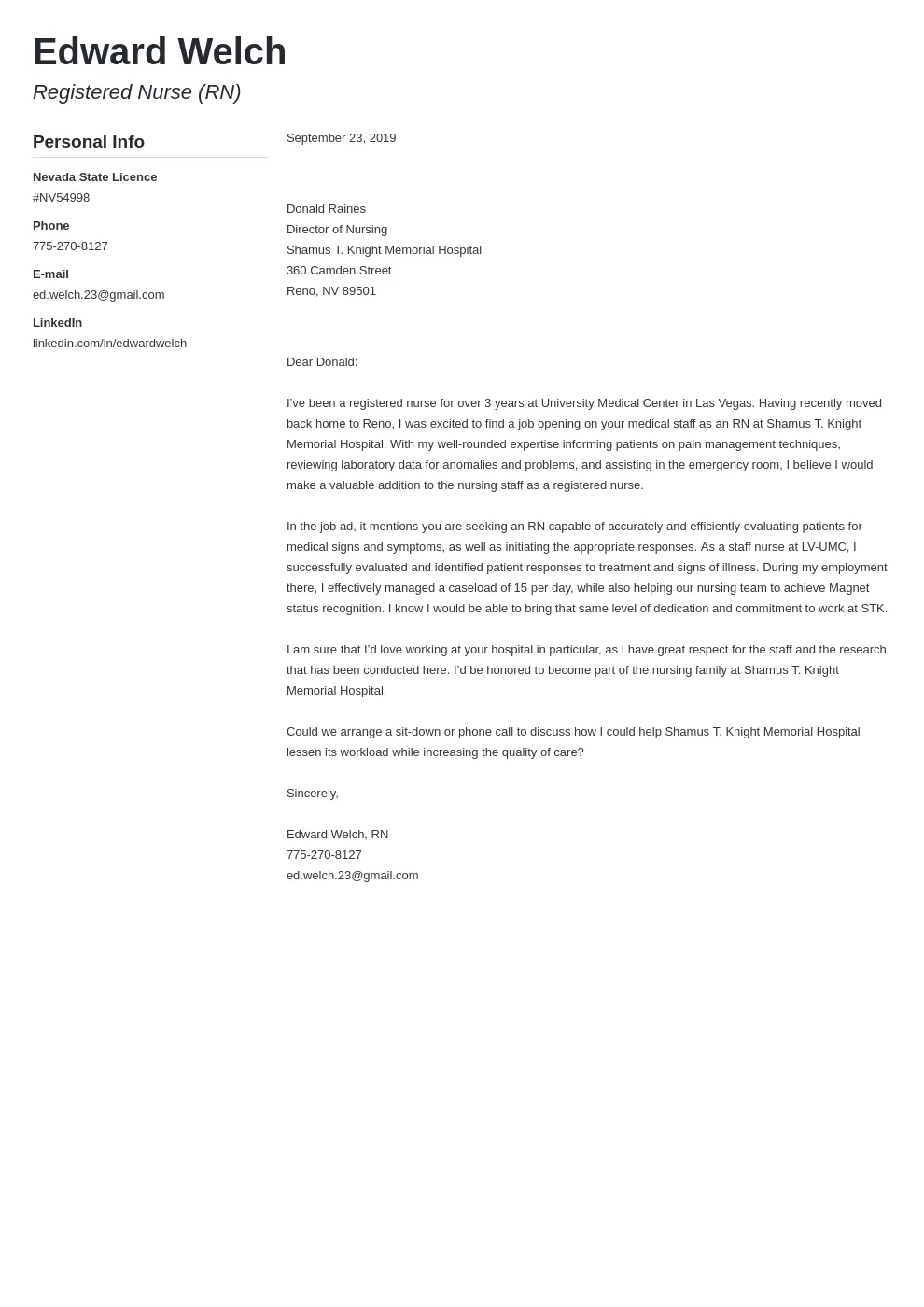
Your cover letter should act as a platform to emphasize your essential credentials and practical experience. Start by mentioning your Nurse Practitioner (NP) certification, the area of specialization, and the states where you hold your licenses. Following this, describe your accomplishments in a way that the recruiter can easily assess. Mention any relevant clinical experiences, such as the number of patients you have seen per day, and detail any specialties you possess, like cardiology, oncology, or pediatrics. Furthermore, make sure to emphasize any advanced skills, such as the ability to perform advanced diagnostics or implement novel treatment strategies. Show, do not simply tell, by supplying particular instances of how your actions directly improved patient outcomes or streamlined processes. This will highlight your worth and make your candidacy more convincing. (nurse-practitioner-experience)
Key Components of a Nurse Practitioner Cover Letter
Contact Information and Date
Begin your cover letter with your contact information. Include your full name, address, phone number, and professional email address. Directly beneath your contact details, include the date of the letter. Ensure that the date is formatted appropriately for the region where you are applying. This standard header provides essential contact information, allowing the employer to quickly identify you and reach out if necessary. Your contact information and the date will be at the top of the cover letter.
Greeting and Opening
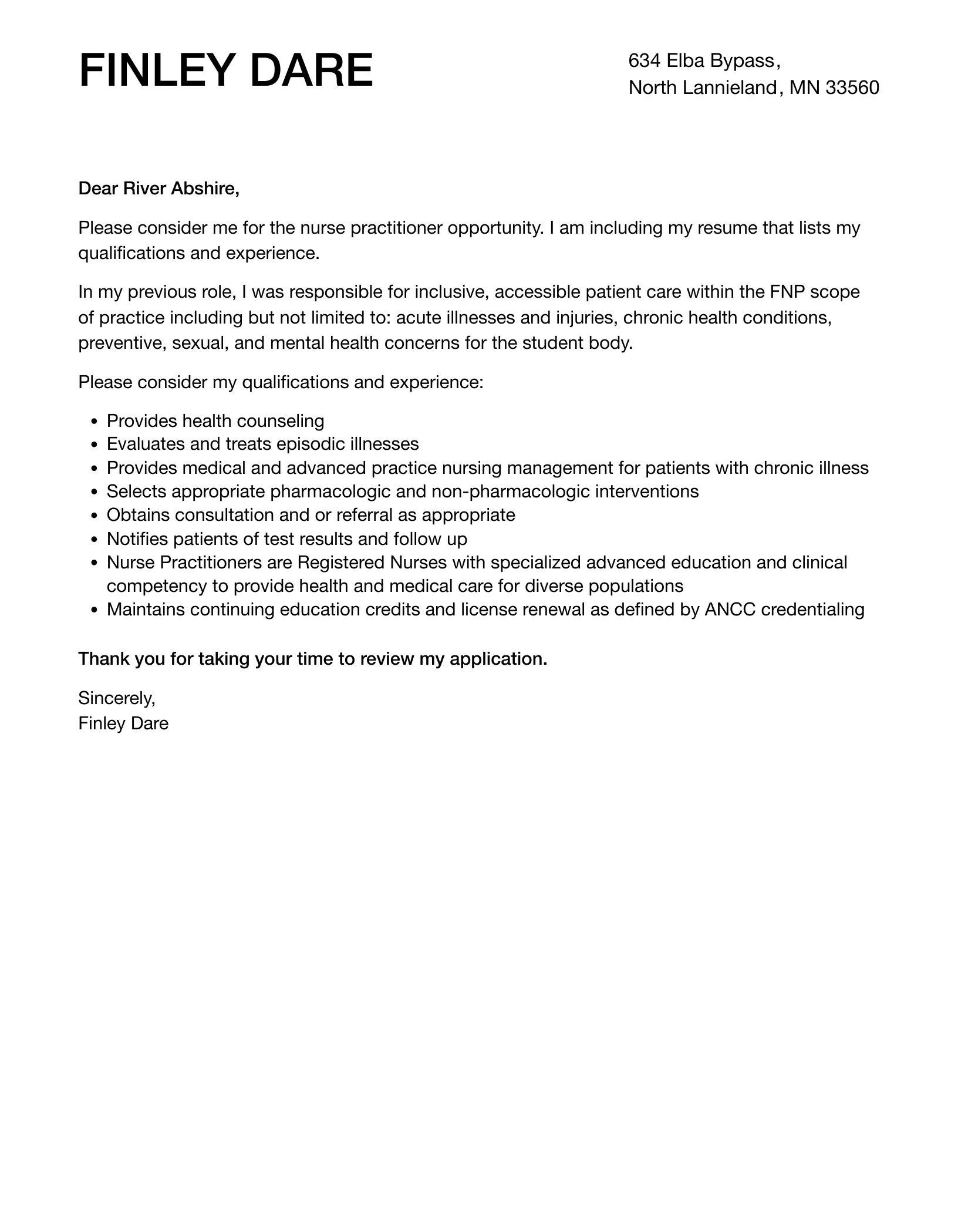
The greeting sets the tone for your letter. Whenever possible, address the hiring manager by name. Research the organization to find the hiring manager’s name and title. If you can’t find a specific name, use a professional salutation like “Dear Hiring Manager.” Your opening paragraph should grab the reader’s attention. Briefly state the position you’re applying for and how you found the job. Highlight your key qualifications that match the job description. This initial section is your chance to make a strong first impression.
Body Paragraphs
The body paragraphs are where you showcase your skills, experience, and passion. This section allows you to delve deeper into your qualifications and why you are a good fit for the position. Structure the body paragraphs to address the key requirements of the job description. Provide specific examples of your accomplishments and skills. Quantify your achievements whenever possible – for example, “Managed a patient load of 20 patients per day.” Use action verbs to describe your responsibilities and achievements, such as “Implemented,” “Managed,” “Trained,” or “Improved.” (nurse-practitioner-skills)
Highlighting relevant experience
In your cover letter, highlight all the work experience relevant to the position you’re seeking. This can include past positions, clinical experiences, and volunteer work. Describe the tasks you performed, the skills you developed, and the outcomes you achieved in each role. Focus on experiences that align with the job requirements. For instance, if the job description emphasizes experience in chronic disease management, detail your experience in managing patients with diabetes or hypertension, and describe how your actions improved their health outcomes. Use specific examples and quantifiable results to make your achievements more impactful.
Showcasing your skills
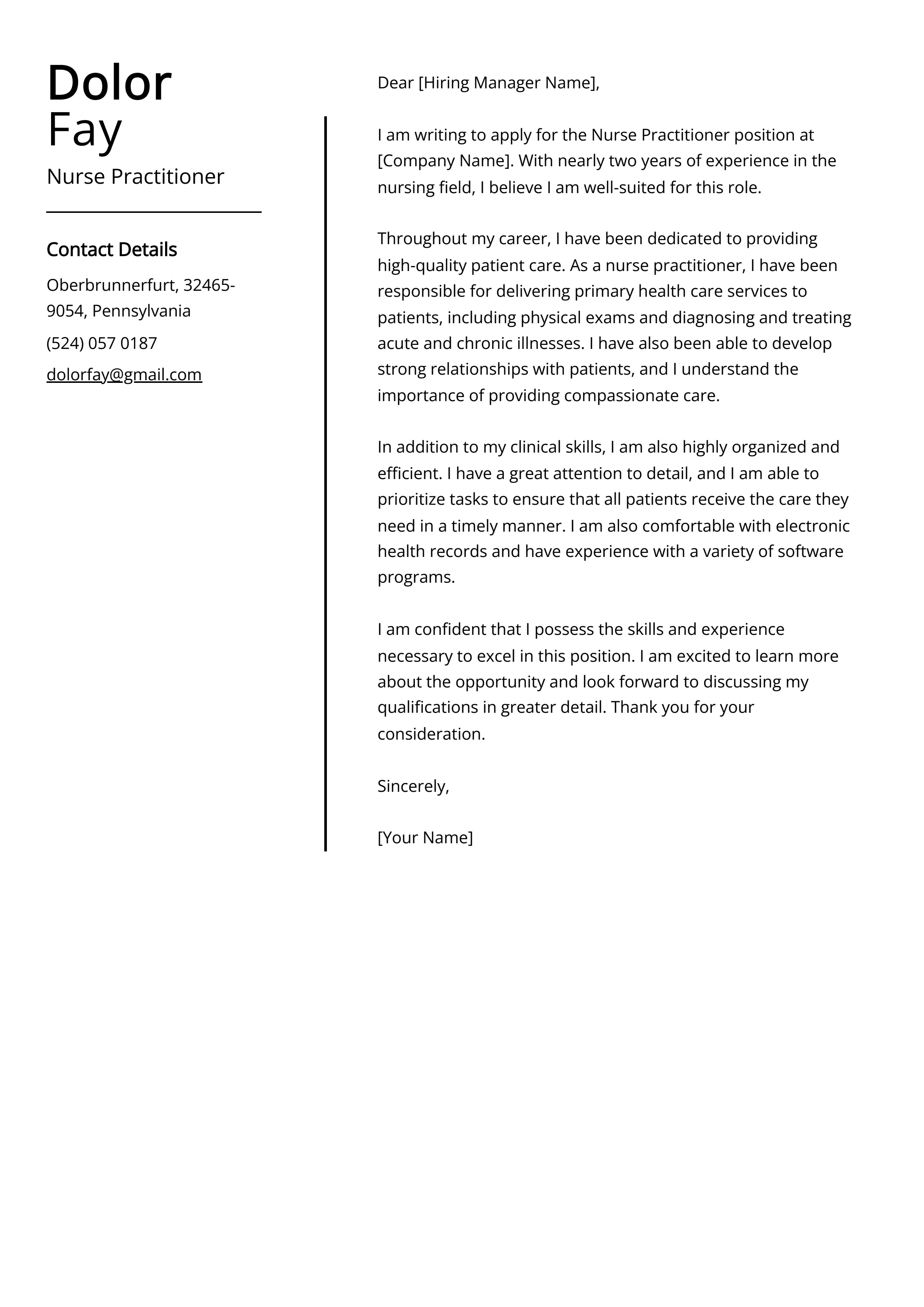
Demonstrate your abilities by focusing on the skills most relevant to the job requirements. This includes clinical skills such as patient assessment, diagnosis, and treatment, as well as soft skills such as communication, teamwork, and problem-solving. Provide particular instances of when you have used these skills to improve patient results or enhance healthcare procedures. For instance, describe how you used active listening to improve patient satisfaction scores or how you collaborated with a multidisciplinary team to deliver comprehensive treatment strategies. This will demonstrate your practical expertise and prove your capacity to work effectively in the role.
Demonstrating your passion
Convey your passion for nursing and the specific role you are applying for. Explain why you are interested in the position and the organization. Describe what motivates you, such as a dedication to patient care, a desire to make a difference, or a passion for a particular area of medicine. Mention any specific projects or initiatives that align with your interests. Express your enthusiasm for the chance to contribute to the organization’s mission and goals, demonstrating that you are committed to a long-term career within the field. This will distinguish you from other applicants and show the recruiter that you truly care about the role.
Closing and Call to Action
The closing paragraph should summarize your key qualifications and reiterate your interest in the position. Express your enthusiasm for the opportunity and thank the reader for their time and consideration. Include a clear call to action, such as stating your availability for an interview or mentioning that you look forward to discussing your qualifications further. End with a professional closing, such as “Sincerely” or “Best regards,” followed by your typed name. This final touch ensures that your cover letter has a polished and professional appearance.
Tailoring Your Cover Letter
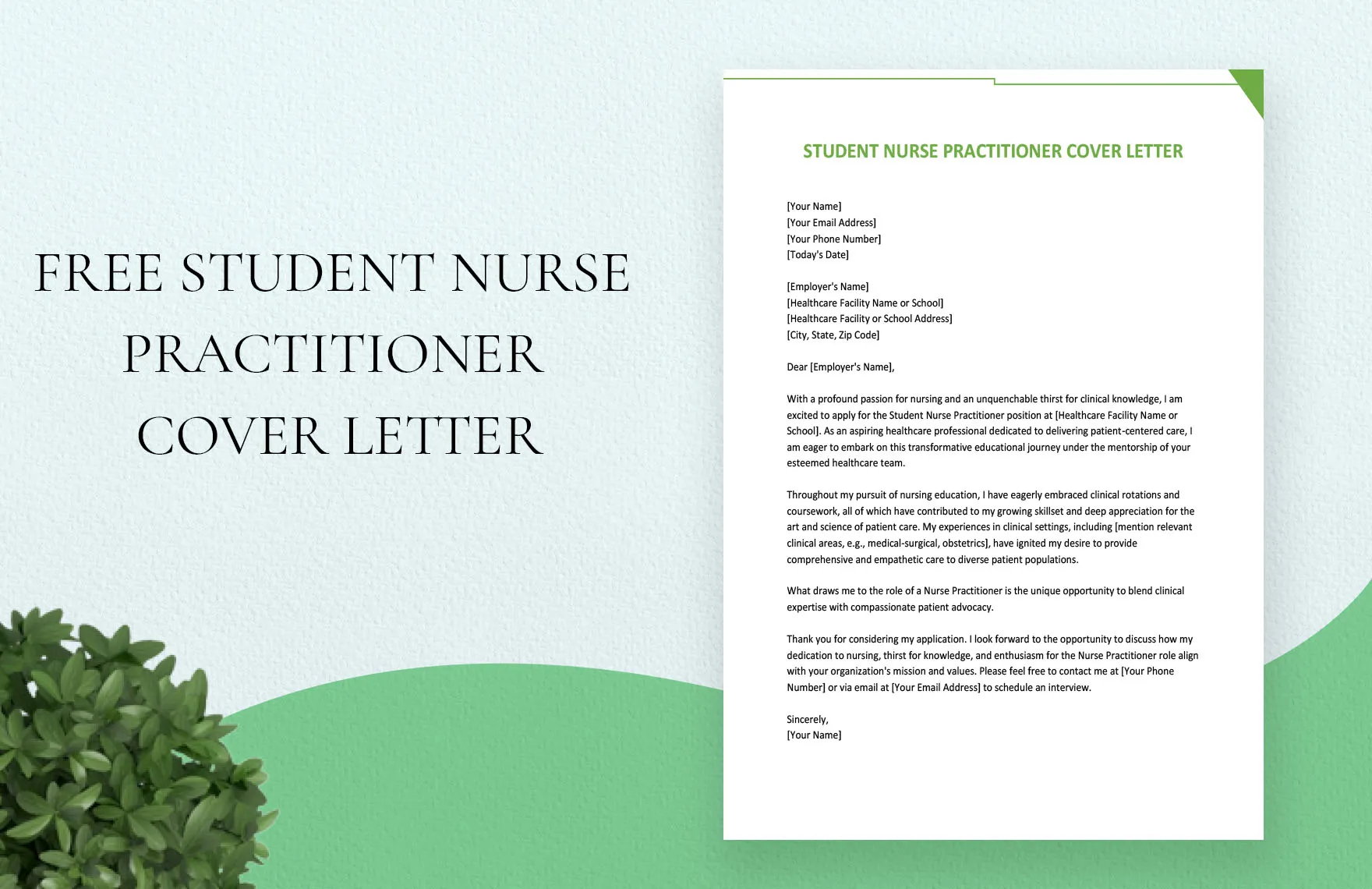
Researching the Employer
Before you start writing, research the employer. Visit the organization’s website to learn about its mission, values, and recent initiatives. Understand the services they provide and the patient population they serve. Look for information on the specific department or team you would be joining. Use this information to customize your cover letter and demonstrate your genuine interest in the organization. Addressing the hiring manager by name can make a good impression. (nurse-practitioner-interview)
Customizing Your Content
Avoid using a generic cover letter. Tailor your content to match the specific job description and the organization’s needs. Review the job posting carefully and identify the key skills and qualifications the employer is seeking. Address these requirements directly in your cover letter, providing examples of how your experience and skills align with the job. Customize each letter to highlight the experiences and skills most relevant to the position, showing you understand the role.
Using Keywords
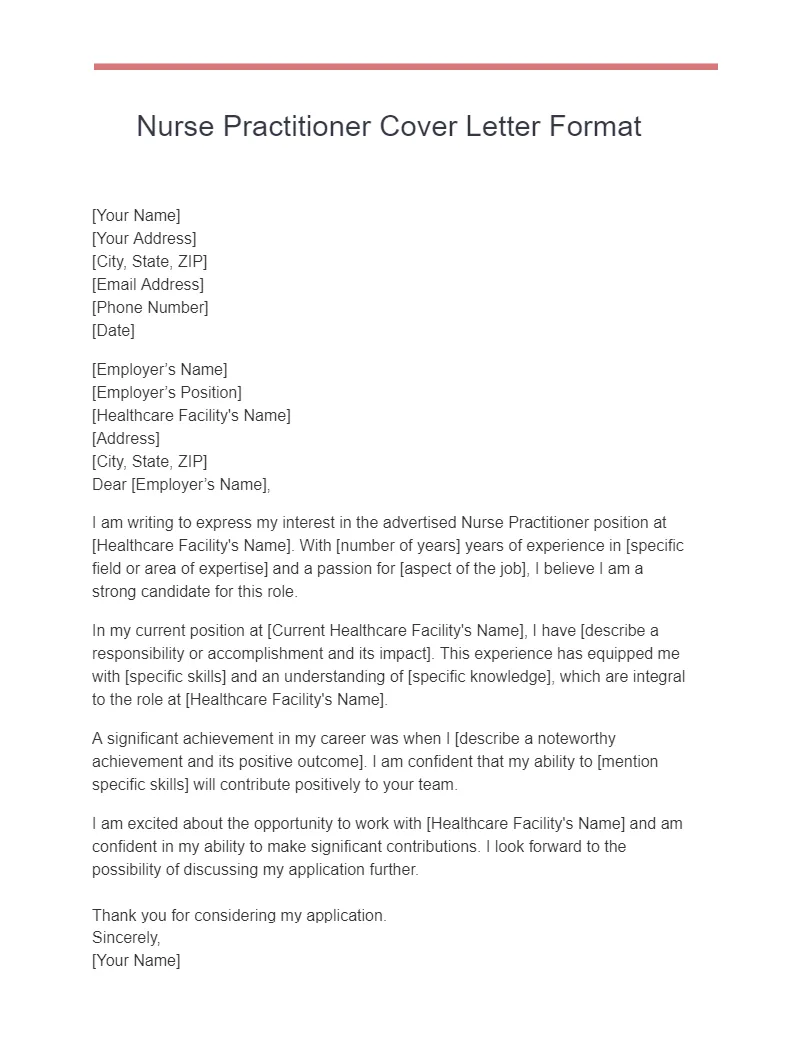
Incorporate keywords from the job description into your cover letter. Applicant Tracking Systems (ATS) often scan cover letters for keywords. By using relevant keywords, you increase the chances of your application being noticed. Sprinkle these terms throughout your cover letter. This helps your application pass through the initial screening process and ensures that your qualifications are immediately recognized by the hiring manager. Always incorporate keywords in a natural way, and avoid keyword stuffing.
Formatting and Presentation
Font and Font Size
Choose a professional and easy-to-read font, such as Times New Roman, Arial, or Calibri. Use a font size between 10 and 12 points to ensure readability. Make sure your font is consistent throughout the document. A clear font and appropriate size enhance readability and make your cover letter look professional. Avoid using unusual or decorative fonts that may distract the reader. Consistent formatting contributes to the overall polished appearance of your application.
Margins and Spacing
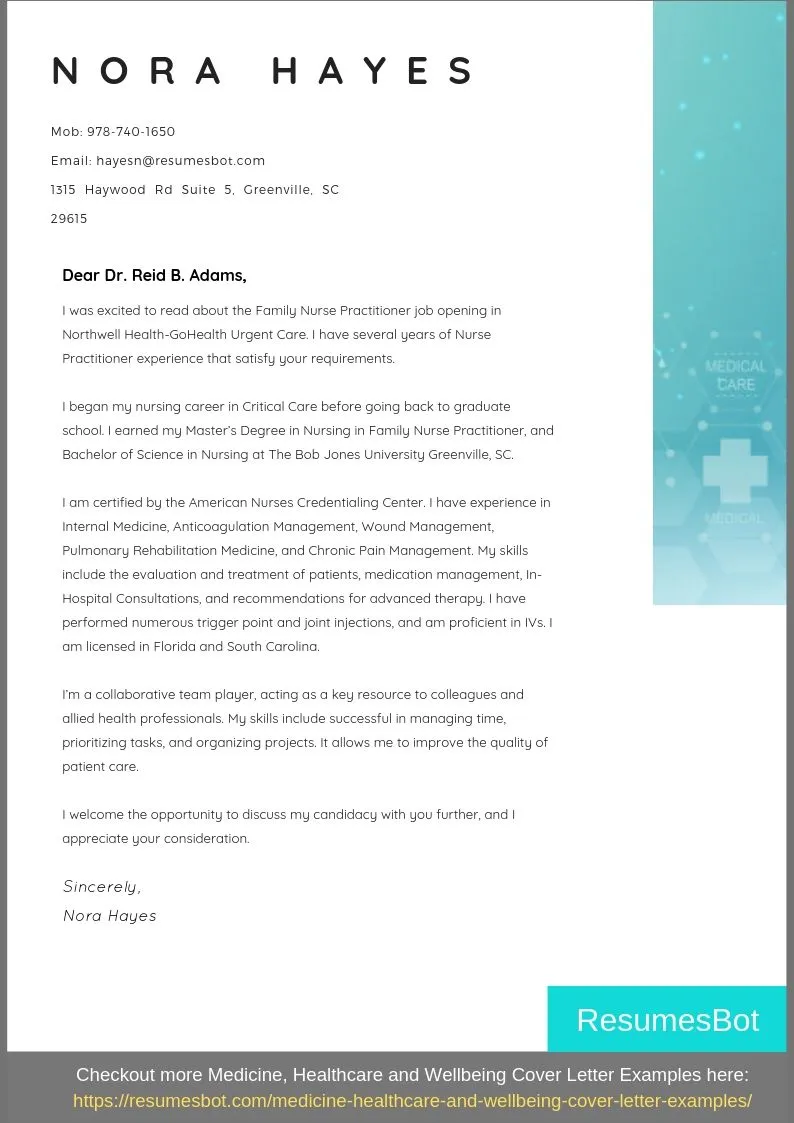
Use standard margins of 1 inch on all sides of your cover letter. Double-space the body of your letter for easy reading. Keep your letter concise and to the point. A well-formatted cover letter is visually appealing and easy to scan. Correct margins and spacing improve the layout of your cover letter, making it more appealing to the reader. A good format will make your application stand out from the competition. (nurse-practitioner-formatting)
Proofreading and Editing
Thoroughly proofread and edit your cover letter before submitting it. Check for grammatical errors, spelling mistakes, and typos. Ensure your sentences are clear, concise, and well-structured. Ask a friend, colleague, or career counselor to review your cover letter for feedback. Proofreading ensures that your cover letter is free of errors and presents a professional image of you as a candidate. Errors can undermine your credibility, so meticulous proofreading is essential. (nurse-practitioner-proofreading)
Common Mistakes to Avoid
Generic Letters
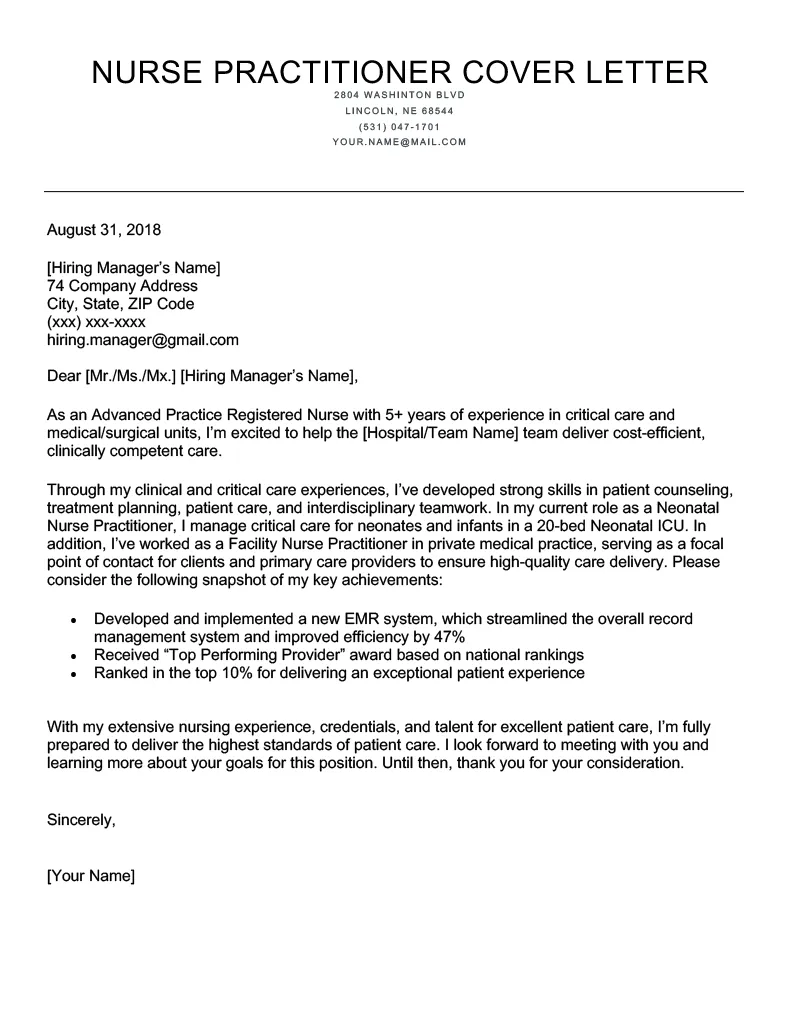
Avoid using generic cover letters. Tailor each letter to the specific job and organization. Customize your content to highlight your relevant skills and experience for each position. A generic letter demonstrates a lack of effort and interest, and it is unlikely to make a positive impression.
Typos and Grammatical Errors
Typos and grammatical errors can damage your credibility. Proofread your cover letter carefully before submitting it. Ensure that your writing is polished and error-free. A polished cover letter is an important indicator of your attention to detail and your commitment to presenting yourself in the best possible light.
Focusing on Yourself Too Much
While it is essential to describe your skills and experiences, focus on how you can benefit the employer. Highlight your accomplishments and how they align with the needs of the organization. Shift your focus from what you want to gain from the job to what you can contribute. This approach demonstrates your value as a potential employee. This makes your cover letter more compelling.
Nurse Practitioner Cover Letter Examples
Here are three examples of cover letters, each focusing on different aspects of a Nurse Practitioner’s experience.
Example 1 Focused on Clinical Experience
Dear [Hiring Manager Name],
I am writing to express my keen interest in the Nurse Practitioner position at [Hospital Name], as advertised on [Platform]. With over five years of experience in primary care, I am confident in my ability to provide exceptional patient care and contribute to your team’s success. In my previous role at [Clinic Name], I managed a patient load of 25-30 patients daily, diagnosing and treating a wide range of conditions. I have a track record of improving patient outcomes through evidence-based practice and patient education. I am particularly proficient in [Specific skills/specializations]. I am eager to leverage my experience and passion for patient-centered care at [Hospital Name]. I would welcome the chance to discuss my qualifications in detail. Thank you for your time and consideration.
Sincerely, [Your Name]
Example 2 Emphasizing Leadership Skills
Dear [Hiring Manager Name],
I am writing to express my interest in the Nurse Practitioner position at [Hospital Name]. I have a strong background in [Specialty] with over eight years of progressive experience in leadership and management roles. At [Hospital Name], I led a team of nurses, implemented new clinical procedures, and improved the quality of patient care. I am passionate about mentoring and educating team members. My commitment to patient-centered care and team building makes me a strong candidate. I have a proven ability to drive positive change and create a collaborative environment. I am keen to contribute to [Hospital Name]’s innovative approach. Thank you for your time and consideration.
Sincerely, [Your Name]
Example 3 Showcasing Specialization
Dear [Hiring Manager Name],
I am writing to apply for the Nurse Practitioner role in [Specialty] at [Hospital Name]. I am a certified Nurse Practitioner with a focus on [Specific Specialization]. I have a track record of providing specialized care to patients with chronic illnesses. During my time at [Previous Hospital], I managed a specialized patient population, developed treatment plans, and collaborated with interdisciplinary teams. My dedication to improving patient outcomes and my expertise in [Specialization] align perfectly with the needs of the position at [Hospital Name]. I look forward to discussing my qualifications with you.
Sincerely, [Your Name]
Final Thoughts
Writing a compelling Nurse Practitioner cover letter is an essential step in your job search. This document should be meticulously formatted and personalized to highlight the specific skills and experiences that match the needs of the hiring organization. By following the guidelines provided, you can craft a cover letter that gets the attention of the hiring manager and increases your chances of landing an interview. Always remember that your cover letter offers the first chance to tell your story. By crafting a convincing narrative, you can make a lasting impression on a potential employer and advance your career.
